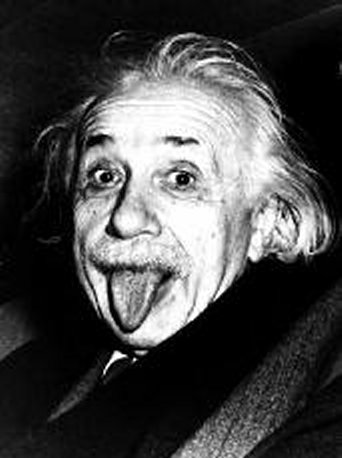
Albert Einstein
(1879 - 1955)
One of the greatest physicists of all time, Nobel Prize winner and discoverer of the special and general theory of relativity, Albert Einstein was born on March 14, 1879, in Ulm, Wurttemberg, of Jewish parents.
He spent his early years in Munich where his father set up a small electrochemical business. As a boy he was fascinated by algebra and geometry, though he detested the barracks discipline of German schools. In 1896, he entered the Swiss Federal Polytechnic School in Zurich, graduating in 1900 and receiving his doctorate from Zurich in 1905. Unable to get an academic position, he took a post with the patent office in Bern while continuing to pursue his concern with the fundamental problems of physics.
In 1905, he published four brilliant papers in the Annalen der Physik which were to transform twentieth-century scientific thought. He established the special theory of relativity, predicted the equivalence of mass (m) and energy (e) according to the equation e = mc2, where (c) represents the velocity of light; he created the theory of Brownian motion and founded the photon theory of light (photoelectric effect) for which he received the Nobel Prize in 1921.
Einstein joined the German University of Prague in 1910 and then, in 1913, through Max Planck received a Professorship at the Prussian Academy of Science in Berlin.
In 1916, Einstein published his Die Grundlagen der allgemeinen Relativitatstheorie (Relativity, the Special and the General Theory: A Popular Exposition, 1920), which profoundly modified the simple concepts of space and time on which Newtonian mechanics had been based. His prediction of the deflection of light by the gravitational field of the sun was borne out by a British team of scientists at the time of the solar eclipse in 1919, making Einstein a household name.
Throughout the Weimar years he was lionized, especially abroad, though in Germany not only his work but also his pacifist politics aroused violent animosity in extreme right-wing circles. Anti-semites sought to brand his theory of relativity as 'un-German' and during the Third Reich they partially achieved their objective, when Einstein's name could no longer be mentioned in lectures or scholarly papers, though his relativity theory was still taught.
During the 1920s Einstein travelled widely in Europe, America and Asia and identified himself with various public causes such as pacifism, Zionism, the League of Nations and European unity. When Hitler came to power in January 1933, Einstein was in California and he never returned to Germany, being almost immediately deprived of his posts in Berlin and his membership of the Prussian Academy of Sciences.
His property was seized and a price put on his head by Nazi fanatics. His books were among those burned publicly on May 10, 1933, as manifestations of the 'un-German spirit'. As an outspoken opponent of National Socialism his name became synonymous with treason in the Third Reich.
Einstein emigrated to the United States where he became a Professor at the Institute of Advanced Studies (Princeton) and an American citizen in 1940. Alarmed at the prospect that Hitler's Germany might acquire an atomic bomb after two German physicists had discovered the fission of uranium, Einstein signed a letter to President Roosevelt in August 1939, which sparked off the Manhattan project. It was one of the great ironies of his career that the pacifist Einstein, through this action, should have helped initiate the era of nuclear weapons to whose use he was completely opposed.
A lifelong opponent of nationalism, Einstein regarded the Third Reich as a catastrophe for civilization.
Active in Jewish causes he was offered the Presidency of the State of Israel, but declined, “being deeply touched by the offer but not suited for the position.”
His simplicity, benevolence and good humour as well as his scientific genius gave Einstein a unique fame and prestige among physicists, even though after the mid-1920s he diverged from the main trends in the field, especially disliking the probabilistic interpretation of the universe associated with quantum theory.
The best-known refugee from Nazism and one of its most adamant critics, Einstein died in Princeton on April 18, 1955.
Courtesy of:
http://www.jewishvirtuallibrary.org/jsource/biography/einstein.html
